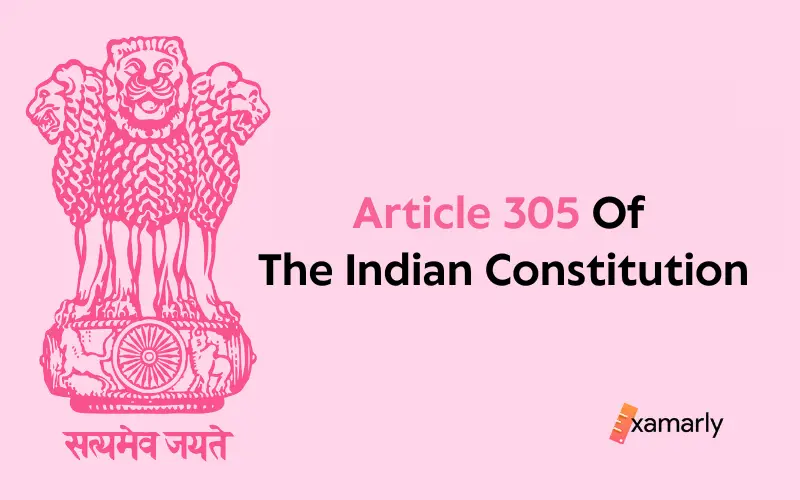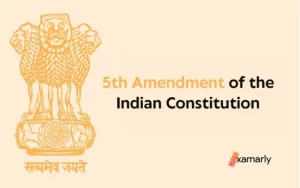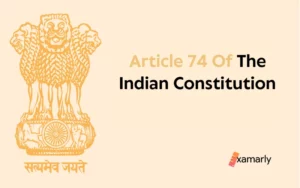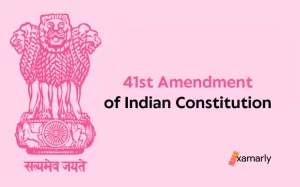Article 305 of the Indian Constitution is a saving clause that applies to the provisions of Articles 301 and 303, which deal with trade and commerce.
It provides that the provisions of any existing law, except in so far as the President may direct otherwise, shall not be affected by Articles 301 and 303.
Let us get to know more about Article 305 of the Indian Constitution to have a better understanding.
What Does Article 305 Of The Indian Constitution Say?
305. Saving of existing laws and laws providing for State monopolies Nothing in Articles 301 and 303 shall affect the provisions of any existing law except in so far as the President may be order otherwise direct; and nothing in Article 301 shall affect the operation of any law made before the commencement of the Constitution (Fourth Amendment) Act, 1955 , in so far as it relates to, or prevent Parliament or the Legislature of a State from making any law relating to, any such matter as is referred to in sub clause (ii) of clause ( 6 ) of Article 19
Article 305 of the Indian Constitution says that nothing in Articles 301 and 303 can change the laws that are already in place unless the President tells them to.
It also says that nothing in Article 301 shall affect the operation of any law made prior to the commencement of the Constitution (Fourth Amendment) Act, 1955, insofar as it relates to, or prevent Parliament or the Legislature of a State from making any law relating to, any such matter as is referred to in sub-clause (ii) of clause (6) of Article 19.
Summing Up
We can conclude from Article 305 of the Indian Constitution that the provisions of Articles 301 and 303, which deal with trade and commerce, are saved by Article 305 of the Indian Constitution.
It states that the provisions of Articles 301 and 303 shall have no effect on the terms of any existing law, unless the President specifically directs otherwise.
Furthermore, the provisions of Article 301 must not impair the operation of any legislation enacted prior to the Constitution (Fourth Amendment) Act, 1955, relating to a topic referred to in subclause (ii) of clause (6) of Article 19.
Article 19(6)(ii) empowers the state to enact legislation placing reasonable limits on the freedom of trade, commerce, and intercourse for the public good.
As a result, Article 305 permits the state to continue to enforce any existing laws governing trade, commerce, and intercourse inside the state, as long as they are compatible with the requirements of the Constitution and do not discriminate against products from other states.
FAQs On Article 305 Of The Indian Constitution
What is the role of the government in trade and commerce in India?
The government of India plays a crucial role in regulating trade and commerce in the country. It does this through various policies, laws, and regulations that are aimed at promoting and protecting the interests of traders and consumers. The government also plays a role in facilitating trade by providing infrastructure, such as roads, ports, airports, and telecommunications facilities, that are necessary for the smooth functioning of trade.
What are the main sources of trade and commerce in India?
The main sources of trade and commerce in India are:
Domestic trade: This refers to the exchange of goods and services within the boundaries of India. Domestic trade includes both wholesale and retail trade.
International trade: This refers to the exchange of goods and services between India and other countries. India’s international trade is primarily conducted through exports and imports.
What are the main types of trade in India?
The main types of trade in India are:
Wholesale trade: This refers to the sale of goods in large quantities to traders or other businesses, who then sell the goods to consumers in smaller quantities.
Retail trade: This refers to the sale of goods to consumers in small quantities, usually through shops or stores.
Export trade: This refers to the sale of goods and services to other countries.
Import Trade: This refers to the purchase of goods and services from other countries.






